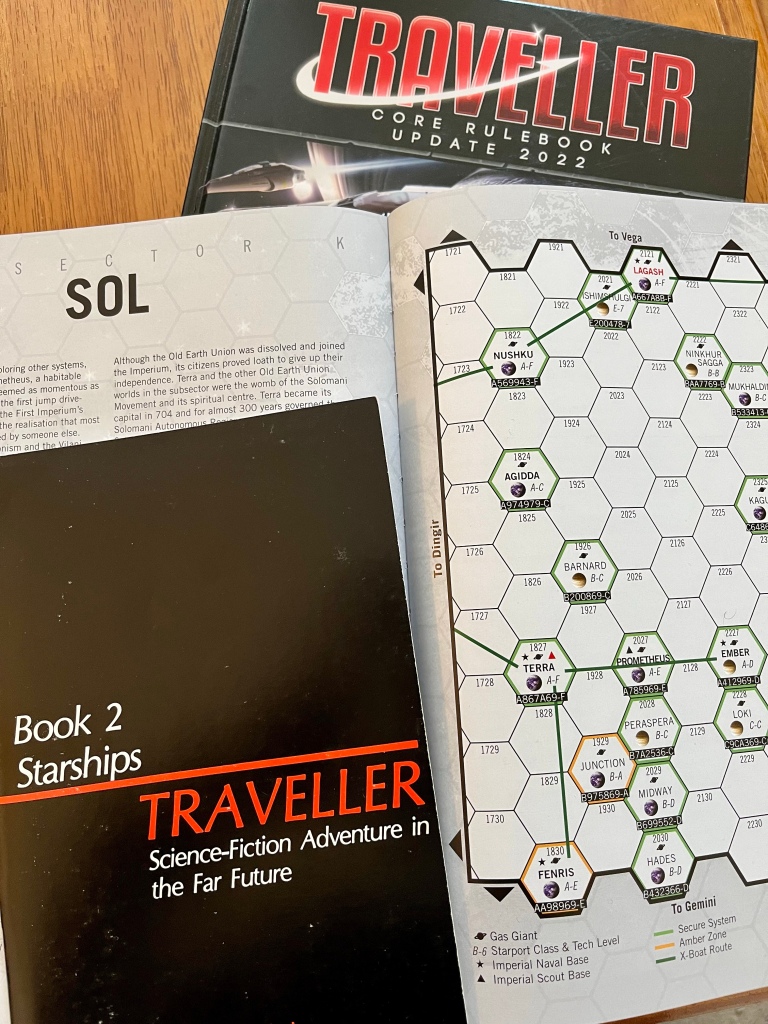The past 24 hours of playing Mongoose Traveller have had a profound negative impact on my confidence that this game provides a good starting point for science-fiction roleplaying. While I enjoyed generating characters, my next step has laid bare the poor design decisions made in other areas of the game. In particular, I had a very poor experience with the simple act of picking up some cargo to trade.
This post includes an extended extract from my in-play solo notes interacting with the trade rules in the Traveller Core Rulebook. It’s raw and rough, but I think it lays out the problem. I’ll then reflect on what I really wanted and how best to provide it.

Context: Aboard Midnight Falcon
The Midnight Falcon is on the Solomani Rim, a decision based on Hosea being from Arcturus and Heiko hailing from Terra itself. I had arbitrarily decided to begin with the ship docked at Ember in the Sol subsector. For this session of play, I am utilising the Mongoose Traveller core rules and adding the Solomani Front sourcebook to the mix. That being said, I am only really interested in the Starship Operations and Trade chapters plus the Solomani Front‘s data on star systems for trading.
The first trip was from Ember to Prometheus and I used just the passengers, freight, and mail rules at this stage. The “speculative trade and smuggling” bit looked like another step of complexity, and I just wanted to see if you could make money with the basic trade system. The rules-as-written were a little hard to decipher and I made a mistake on the first trade. Picking up for a trip from Prometheus to Barnard, I decided to double-down on the rules and noted every step as I followed it.
Prometheus to Barnard
Cargo comes in lots organised into three sizes: Major, Minor, and Incidental. The number of available lots going to a given destination world is rolled with 2D on the Freight Traffic table. Modifiers come from a combination of the effect from a character’s Broker or Streetwise check and values based on the worlds involved.
Prometheus to Barnard creates a DM+14 in total before we roll. Heiko will use Streetwise to see what he can find but will spend time pouring over the freight traffic reports to try and find the better offers. Given this approach, I rule he can use INT (rather than SOC) with his check, giving him a DM+2. The roll… 5+2 = 7 to give an effect of -1. This makes the total Freight Traffic DM+13.
Rolling the Freight lots for Major (applying the additional DM-4, as listed), there are… 2+13 = 15 = 6D lots of 1Dx10 cargo. This gives us… 6 lots… 10 tons, 30 tons, 50 tons, 40 tons, 40 tons, and 20 tons. Oh my goodness, I am bored already.
Why am I doing this? The ship only has 23 tonnes of space. I will grab the 20 tons lot and get paid Cr1600 per ton, which is Cr32000 total. Why did I need to roll up all the other lots? Yes, I can roll up the Minor Lots and the Incidental Lots, perhaps giving me a magic combination of Incidental Lots that add up to 3 and fill the remaining space. But this is taking a looooooog time to resolve.
Classic Traveller Rerun
I went and looked in my Classic Traveller Book 2: Starships (1977), found the rule on page 7 under “Revenue” for Cargo. It’s much simpler for everyone. Let’s re-run the situation with Classic Traveller:
My crew has 23 tonnes of cargo space and they are willing to transport cargo for a fixed rate to Barnard. This world has a Population of 8, so I roll 8D with each die representing a load of cargo of tonnage equal to the value on the die multiplied by 5. Rolling 8D… the tonnages are: 5, 15, 15, 20, 20, 25, 30, 30. You get paid Cr1000 per ton shipped. We can take a 20-ton load, so it’s largely irrelevant which ones but the whole process took about 30 seconds to resolve. Moving quickly on, right?
Cepheus Rerun
I also took a peek inside Cepheus, the retroclone of Traveller that’s available for free on DriveThruRPG. Here’s how it plays out in that system:
Rolling on the Available Freight and Passengers table, the Class-B starport at Barnard offers 3d6x5 tonnes of cargo. I roll… 12×5 = 60 tonnes. You can take as much or as little of that as you like, so I take 23 tonnes and get paid Cr1000 per ton for a total of Cr23,000.
Reflections
What I really wanted to know was if there was any cargo to haul, how much I’d get paid, and then move on with the play. If this is going to just be about the simple maths of having an income for your starship and it’s not going to have any really meaningful decisions, then the Cepheus approach gets the job done. Roll to see how much cargo is available, take what you can, and ker-ching.
I prefer the Classic Traveller approach for one reason: it organises the cargo into 5-ton lots based on the individual dice rolled, which feels like it invites a little more narrative opportunity. The Referee can describe the type of cargo and the “take the lot or leave it” approach feels more believable. I mean, I can’t really see the broker allowing one ship to take some of a cargo load and then hoping another ship will take the rest because that would be risky and complex in reality. I also feel that, as a player, the cargo spaces left on your ship might nudge you towards trying the speculative trading system to top up your income.
Mongoose Traveller seems needlessly complex, making dice rolls and handling modifiers that are really not going to make much difference to the outcome. The problem is really that it takes too long to make all those rolls. There’s a section in the sidebar in the rulebook that suggests that by handing these rules over to the players, the Referee can “concentrate on their own adventure” and take the time to prep a new encounter. It’s almost as if the rules have been designed to take a long time and provide an interlude for the harried Referee.
Is this a pitch to play Classic Traveller? Not especially. But this whole experience has been another strike against running with Mongoose’s offering.
More deeply, I feel that there is a trick being missed in both Cepheus and Mongoose Traveller. In short, I feel like there is an opportunity to add a layer of depth to the game by building a workable and simple game structure for trading. I think the Classic Traveller rules give the firmest hint of this with the idea of cargo lots. What I want to know is what’s in those cargo lots, why shouldn’t I just go use the speculative trade system, and overall, what’s this adding to my science-fiction roleplaying game experience?
Much to ponder.
Game on!

It’s been so long since I’ve done Traveller trading, so it was nice to follow your exploration. I use Cepheus Deluxe now, which on checking is different again. I’m not sure if it would get you where you want to go, but might be worth a look? The SRD is free.
LikeLiked by 1 person
I have Cepheus Deluxe but haven’t really dug into it. Thanks for the nudge to go dust it off. 😉
LikeLike
LOL. I’m a confirmed CT gamer myself, but I must confess that I never had a party that could break even Free Trading, let alone make a decent profit. I know, on some level there’s the thought that you have to force the players to take risks and go on adventures, but the basic economics should still work.
LikeLike
I have really never fiddled with the trading/cargo rules. None of my players have been interested. Could see them using the rules to offset the cost of travel when using refined fuel (not skimmed). Regarding the simplicity of the rules from Classic Traveller – yeah – that game holds up in a lot of ways. Simplicity for one. Enough crunch to make it random and “a game” with rules and whatnot, but not oppressive.
LikeLike
another blog I was reading was also covering Traveler,thought you might want a peek.
https://www.gaming.concretelunch.info/advise-for-new-traveller-or-cepheus-engine-players/
LikeLiked by 1 person